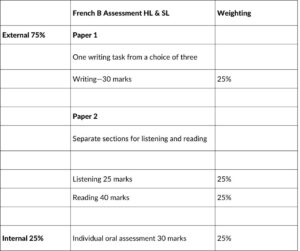So, you’ve chosen a challenging yet beautiful language and you need IB French revision tips to get top grades and pass with flying colors.
Motivation and hard work are half the battle…
…and an effective and all-around revision is the other half.
Here we go through what you can do to become a more confident linguist and try to secure the top grade on your IB French exams.
Get to Know What to Expect in Your Exam
The IB French exam is multi-stage. It consists of external and internal assessments. The external assessment, in turn, has two papers.
Paper 1 assesses your writing skills. You will be offered 3 topics to choose from. You need to pick one and produce a piece of text 450-600 words long.
It contributes to 25% of your total score.
Paper 2 is designed to test your reading and listening skills. You will be given three audio and three written passages, as well as multiple questions to see how well you understood them. This paper demands shorter answers, multi-choice questions, true or false statements, or other types of questions.
It makes up 50% of the total grade.
The concluding stage of your exam, the Internal assessment or French IA, gauges your oral skills.
Being equal to 25% of your final grade, it requires you to give a short presentation based on the theme you choose. The theme depends either on a visual stimulus (for SL students) or an excerpt from a literary work (for HL students).
As you can see, the IB French exam tests your key skills – writing, reading, listening, and speaking. That’s why it is extremely important that you polish all of them during your revision.
Source IBO
Below, you’ll find some handy tips to perfect these skills.
IB French revision tips – Writing
The writing assessment not only tests your grammar and vocabulary but also your ability to use the appropriate register of language.
There are three text types you will be working with: personal (blog, entry, diary), professional (letter, email, etc.), and mass media (speech, article, etc.). To know all the ins and outs of these formats, you need to regularly practice with them.
Learning a language is like strengthening a muscle. So you need to regularly to work out if you want to make progress.
Here are some IB French writing revision tips for you to practise your skillls:
- Keep a journal in French describing how you spend your days. At first, these writings can be quite simplistic, noting down new vocab as you go. Then as the days go by, you should try to make the phrases more complex and in-depth.
- Read newspaper articles. The more you read, the more words, idioms, and phrases you’ll get to know. This will make your language richer. Write down these new words in a vocabulary notebook and incorporate in your writing as often as possible.
- Also, find a blog you like and summarise key articles. In fact, choose one that is about one of your interest areas. Then, after each article or blog that you’ve read, try to summarize or express your opinion about it in written form.
IB French revision tips – Listening
The best way to tune your ear into French is to listen to native speakers.
Surrounding yourself with French speech can help you catch nuances, such as an accent, pronunciation of specific sounds or words, emphasis on certain words in a sentence, etc.
French is one of the most widely spoken languages in the world, so you shouldn’t have any problems with finding video and audio content matching your needs.
-
Listen to French songs, podcasts, or radio programs
, to make revision fun.
- Coffee Break French – Gives you a chance to listen to a French conversation and then breaks it down into grammar points. It builds up from easy to more advanced so you can join the podcast at the right level for you.
- News in Slow French – This is great for learners as it reads the daily news at a slow pace. So this allows you to gradually attune yourself to the language. Even better, there are multiple levels available.
- One thing in French a day – a fun podcast released three times a week. It is about an experience in a Parisian woman’s life. So, it is good for daily life vocab and cultural understanding. While being short and sweet.
-
Try to spend your screen time immersing yourself in French.
You may not always have the energy but as well as watching movies in your native language, TV shows, cartoons, YouTube videos can also help you improve your French.
- The great thing about video content is that it often has subtitles. If you are not able to catch what is said the first time, subtitles are going to be of good use. Watch a video once or twice with subtitles and then disable them to see if you can discern previously unclear phrases.
- As you watch or listen to content in French, make a pause after each sentence and repeat what was said. This will help to refine your pronunciation.
-
One more thing you can do is find a dialogue partner.
This can be a classmate with a good command of French or someone from online platforms that connect native speakers to French enthusiasts. If you are attending an international school you might have the luck of being able to partner with a French native speaker.
-
Finally, you can get help from an experienced IB teacher and work with a French tutor. This approach is actually a win-win since it simultaneously improves your listening and speaking skills. At the same time, they can help you build your confidence.
You should also try and choose content from different parts of the Francophone world.
Not only will this introduce you to various accents but also it contributes to international mindedness, one of the pillars of the IB French course.
IB French revision tips – Reading
Our advice here is pretty straightforward: read, read, read. French books, newspapers, magazines, and blogs are excellent tools for upgrading your reading skills.
Our key IB French revision tip for all IB French students is that they should pick materials for reading by sticking to the themes outlined in the syllabus.
If you’re an Ab Initio student, we recommend starting with something as simple as children’s books, or comics. Their lexicon is quite simple but they can help you find words you don’t yet know. As your skills progress, you can switch to more complex content.
Here are our top 5 comics (or BD as the French say) to make learning fun:
- Les aventures de Tintin
- Blake et Mortimer
- Asterix
- Lucky Luke
- Joe Bar Team
For SL students – don’t be scared if you see unfamiliar words in a text. You might be able to understand the context even if something is not 100% clear.
Still, don’t forget to put new words into your vocabulary. Ideally, you would capture them in a notebook and continue to test yourself.
This will help you accumulate more words that align with course content.
Find a blog that interests you on each of the key themes chosen by your teacher and subscribe. In this way, you will receive regular updates to read and be able to continuously revise and reinforce your learning.
If you’re an HL student, the IB French revision tips are rather different:
- You can shift your focus to topics outside the syllabus since the exam has tasks featuring both familiar and unfamiliar contexts, and you need to be ready to tackle both.
- Broaden your reading skills by re-reading books you have enjoyed in French. Although you’ll want to make sure to avoid “War and Peace” if it is your favorite, you can pick short stories to make it easier for you.
- Put your Kindle into “vocabulary builder mode.” By doing this you will build a list of the words you have looked up. The built-in dictionary speeds up the looking up of unfamiliar words. Plus you can carry it around with you or download the kindle app on your phone so you can fill in dead moments with a bit of revision.
IB French revision tips – Speaking
To become more fluent and efficient in French, you need to speak as much as you can.
Reading a book? Read it out loud. Listening to a podcast? Repeat every sentence you’ve heard.
Writing a piece of text? Retell your story after you finish. Try to find an opportunity to speak French even if you don’t actively study. For example, while washing dishes, tell to yourself ‘Je fais la vaisselle’ and then proceed to explain what you’re doing exactly.
Your friends and family might think you have lost it, but will celebrate with you when you get a top score in your final IB exams.
It is great if you’re able to find a study buddy to converse with. Talking to a peer might be better than talking to yourself. Your partner can help you spot some mistakes or issues in your speech. Dialogue with a friend will give you more confidence in expressing your thoughts in a foreign language, and that’s the key to acing your French oral exam.
What’s even better? Enlisting the help of someone who is competent in French, especially a native speaker.
A French tutor, for example, can become sort of a coach for all the important muscles: tongue, ears, eyes, and most importantly, your brain. After practicing for a while, you’ll notice that French doesn’t feel that foreign anymore.
Getting a ‘7’ in IB French
So we will leave the final word on getting a 7 with Dr. Eva Herlitzius-Karpasitis, an IB tutor at TutorsPlus:
“Reaching the ‘7’ in a language acquisition class requires an equal amount of work on all four skills – reading, listening, speaking, and writing. In addition to the revision of vocabulary, time needs to be set aside for the revision of grammar structures and text types and the application of this knowledge in conversation classes or classes that specifically focus on practicing reading and writing. Mastery in language acquisition classes stems from the language being used as much as possible, ideally drawing on all four competencies of speaking, writing, reading and listening.”
Dr. Eva Herlitzius-Karpasitis (English, German, and French Language Specialist) is available to help with French IB revision.
In other words, our top IB French revision tip is to immerse yourself in French, inside and outside the classroom, to improve all your skills.
We are sure you strive to do it in class, but what about outside the confines of the school? If you feel that assistance wouldn’t come amiss, let us lend you a helping hand.
At Tutors Plus, we understand that the hardest part of getting competent in a foreign language is practice. Our goal is to provide it, and we do it in an entertaining and efficient way that caters to your learning needs.
Tutors Plus is available via phone at 022 731 8148 or email info@tutorsplus.com. Reach out to us today.














